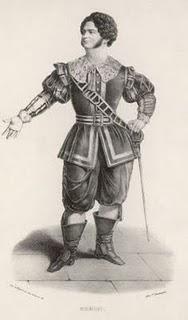Condemned man's aria axed from Anna Bolena.

Giovanni Battista Rubini, the tenor who
created the role of Percy in Anna Bolena.
According to a news item from our friends at Parterre Box, the Metropolitan Opera's new production of Anna Bolena will be subject to a serious cut in its final act, just a month before the work's premiere in Sept. 26.
The aria is "Vivi tu," sung by Riccardo Percy while he is imprisoned in the Tower of London awaiting execution. Met press representative Peter Clarke told parterre that the decision to cut the number was made for "dramatic reasons." The aria was to be sung by tenor Stephen Costello.
With its sweet melodies and soaring high notes, "Vivi tu" is a highlight of the score, allowing the tenor (who has a relatively small part in the opera) his chance to bring the house down. In fact, it was sung in New York in 2010, at the Dell'Arte Ensemble's "black box" production of Anna Bolena. But the aria is also one of the most challenging in the entire bel canto repertory, including a sky-scraping high E♭ above the stave.
Donizetti wrote the aria for Giovanni Battisti Rubini, the 18th century super-tenor who created the leading roles in many bel canto operas, including Lord Arturo Talbo in Bellini's I puritani. The high E♭ note is so difficult that most singers choose to simply transpose the aria down a couple of steps, to make it a nice, safe high C.
But not here. It's been cut entirely.
Anna Bolena will open the Met's 2011-2012 season. The opera stars Anna Netrebko in the title role of the doomed English queen who falls out of favor with her husband, the capricious Henry VIII. The production (by David McVicar) is the first staging of the opera by the Met. It will be part of the Met's Live in HD schedule in the coming months.
According to Brad Wilber's (now defunct) Metropolitan Opera Futures page, the run of Anna is to be followed in the coming decade by Donizetti's other two "Queen" operas, Maria Stuarda and Roberto Devereux. These operas have not been heard at Lincoln Center since the 1970s, when soprano Beverly Sills made the "Three Queens" a central part of her repertory.

